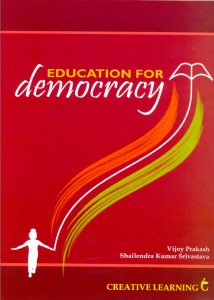
More than half a century has passed since India had adopted democracy as a way of governance. We had also visualised evolution of a democratic society through this process. How far have we moved towards realisation of this goal? How does our adolescent mind think about democracy and democratic way of living? Is our education system capable of producing a citizen as enshrined in our constitution? Now the time has come to study and analyse the mind of school going children who are going to run the future course of our society so as to decide the nature of interventions for our march towards a democratic society.
The book provides an in-depth study conducted on the school going students of Bihar (India) who are going to be the main participants of the democracy in the country. It has tried to diagnose various issues critical for the development of democratic way of living. It also suggests special interventions in the form of ‘Education for Democracy’, which can pave way for evolution of a democratic society. In this connection it outlines the nature of Social Science Laboratories to be established in schools and colleges. It also suggests establishment of Family School to prepare citizens for a democratic society.
Contents
- Aims
- Method of Study
- Demography
- Knowledge about law and democracy
- Law and democracy: Knowledge about basic rights and duties
- Attitude towards democracy
- Authoritarianism
- Nature of governance
- Concerns about rights and freedom
- Orientation towards everyday values
- Perceived importance of different agents of socialization
- Summary
- March towards democratic society
Target audience
Teachers, Trainers, Planners, Academicians, Educational administrators, Social activists
About the authors
Vijoy Prakash is a senior IAS officer. He has held several senior positions at the level of Principal Secretary/ Secretary in the departments of Human Resource Development and Social Welfare in Government of Bihar. Widely acclaimed for his researches in the field of creativity and innovation, he is credited to have developed an innovative system of education known as ‘Creative Learning’. He has applied this theory for holistic development of human beings. Especially this has been used to empower underprivileged by developing their creativity. He has also developed a large number of books and teaching learning materials for the development of concentration, memory, thinking, imagination, visualisation, power of observation and emotional management.
Prof. Shailendra Kumar Srivastava, a nuclear physicist by training, has been fighting for the cause of under-privileged for the last 65years. He retired as a university professor of physics and is a social activist engaged in issues of education, tribal & women’s empowerment. He has written on a wide range of subjects including physics, trade union & labour rights, social movements and education. His other areas of interest include creativism and education for democracy.
